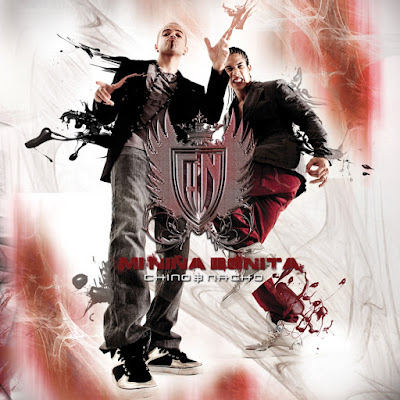20th March, 2010
Theoretically, pop music from a decade ago is the uncanny valley in pop nostalgia: far enough away to sound uncool and irrelevant compared to current work, but not far enough away to have accrued the patina of age, to sound enough unlike contemporary trends that it has its own, entirely separate charm.
And indeed the version of reggaetón that Chino y Nacho, former boy-band members from Venezuela, perpetrate here is very unlike any kind of reggaetón currently keeping pace on the global pop charts: the bright, cheery merengue horns and piano, the uncomplicated puppy-love sentiments supported by charming doo-wop vocalisms, Nacho's motormouthed rapping, are all relics of a more manic, less depressive pop scene.
But they also point toward the current landscape in less obvious ways: the way non-Black South Americans have come to dominate the reggaetón landscape at the levels of highest popularity, the remove of reggaetón from the concrete urban concerns of Puerto Ricans (and before that Panamanians) into a generalized pop language. If it's too simplistic to say that Chino y Nacho ran so that the likes of J Balvin and Karol G could fly, it's also not entirely wrong. A few years ago I drew an invidious comparison between Wisin y Yandel and Andy & Lucas, praising the Puerto Rican reggaetoneros for being more forthright and grown-up than the Spanish prettyboys; part of the story of reggaetón since 2006 is the way in which the Andy & Lucases of the pop world have been assimilated into the tropical riddim.
It's worth pointing out that the first words shouted in the song are the name of its producer Richy Peña, a Dominican-American who had been put onto the international reggaetón radar by Nely "El Arma Secreta" and Don Omar. Peña won a Latin Grammy for "Mi Niña Bonita" -- well-deserved, according to my ears, for the sheer ebullience of the tune -- and a good half of what I love about the song is his work rather than that of Chino y Nacho.
Because I really do love it: I am old enough that a decade ago is no longer distant enough to have fallen into the uncanny valley of pop nostalgia, and the glee and joy I still clearly remember experiencing when hearing it on the radio during my commute in 2010 and 2011 are undimmed by any concerns about coolness or relevance. Merengue and doo-wop were just as uncool in 2010 as they are in 2021, but their deployment here remains as heart-stirring as it was then. If the doofy, lovestruck lyrics were even the slightest bit more cynical or knowing they would ruin the song: its virginal naïveté is part of what makes it great.
A minor classic, compared to the long history of this chart, but a classic nevertheless.

No comments:
Post a Comment